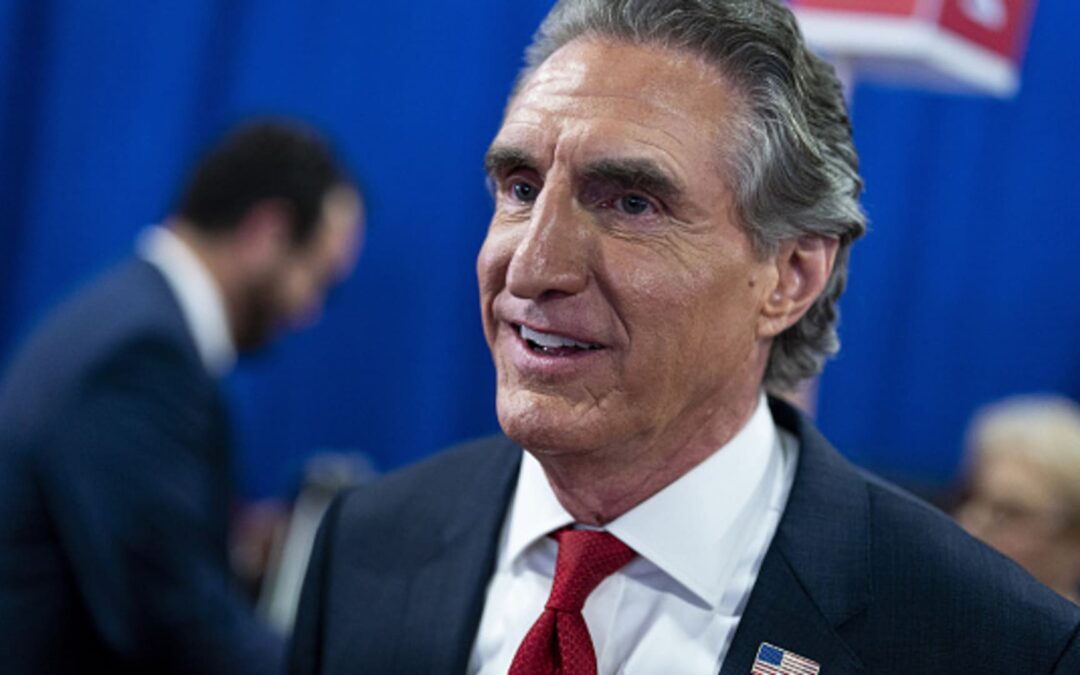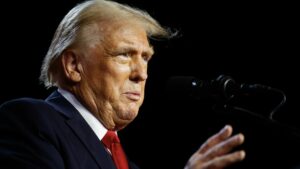North Dakota Gov. Doug Burgum ended his campaign for the Republican presidential nomination on Monday despite a stronger-than-expected showing fueled by a gift card-for-campaign donation gimmick that helped get him on the debate stage.
Burgum, a second-term governor and wealthy software entrepreneur, was little known nationally when he launched his 2024 presidential campaign in June, touting his priorities of energy, the economy and national security, as well as his small-town roots and leadership of the sparsely populated state.
He participated in the first two Republican debates, meeting donor requirements of the Republican National Committee by offering $20 Biden Relief Cards — a jab at rising inflation rates during President Joe Biden’s term — in exchange for $1 donations. The tactic drew skepticism over its legality, though Burgum’s campaign said its legal advisers had reviewed and approved the method.
He failed to qualify for the third debate, however, after coming up short on the polling requirements. And it appeared that he would also not qualify for the fourth debate, which is being held Wednesday in Alabama.
Indeed, he blamed the RNC, which sets qualifications for the debates, for “nationalizing the primary process and taking the power of democracy away from the engaged, thoughtful citizens of Iowa and New Hampshire.”
“It is not their mission to reduce competition and restrict fresh ideas by ‘narrowing the field’ months before the Iowa caucuses or the first in the nation New Hampshire primary,” he wrote in his statement announcing his departure. “These arbitrary criteria ensure advantages for candidates from major media markets on the coasts versus America’s Heartland. None of their debate criteria relate to the qualifications related to actually doing the job of the president.”
Ultimately, he was unable to gain much traction against his rivals in a contest dominated by former President Donald Trump. He joins former Vice President Mike Pence, Sen. Tim Scott of South Carolina, radio show host Larry Elder, businessman Perry Johnson, former Texas congressman Will Hurd and Miami Mayor Francis Suarez in suspending his bid.
Burgum injected millions of his own money into the race, accounting for $12.2 million of the $15.1 million raised by his campaign from March through September, according to Federal Election Commission filings. A super PAC supporting his bid raised over $11 million in the first six months of this year, according to filings.
He nearly missed his first opportunity for national public exposure when he ruptured his Achilles tendon the day before the inaugural debate in August in Milwaukee. But he persevered through, later telling reporters that he stood on one leg behind the podium.
He resumed campaigning with a boot and a knee scooter afterward.
Burgum was a political newcomer in 2016 when he staged an upset over the longtime attorney general in North Dakota’s Republican gubernatorial primary. He is now in his second term as governor and is eligible for a third in 2024, though he hasn’t indicated whether he plans to run again.
Burgum entered office amid the Dakota Access pipeline protests and a massive state revenue shortfall. He touted a vision of “reinventing” state government as a candidate and after winning.
Among his biggest legislative pushes have been a Theodore Roosevelt presidential library near Medora in 2019, income tax relief earlier this year, and again, though unsuccessfully, in an October special session, which kept him off the campaign trail for a few days.
He drew attention in the 2020 and 2022 elections for spending millions of his own money in an effort to target legislative seats held by fellow Republicans, including the longtime chairman of the powerful House budget-writing panel.
In 2021, he vetoed bills banning state-issued mask mandates and restricting transgender students from public schools’ sports, though the Legislature overrode him on the former. In 2023, he signed about a dozen bills opponents saw as restricting transgender people, including new sports bills and a ban on gender-affirming care for kids.
Before his time as governor, Burgum was largely known as a businessman who led Great Plains Software, which Microsoft acquired for over $1 billion in 2001. He stayed on as an executive with Microsoft until 2007. He’s led other companies in real estate development and venture capital.









